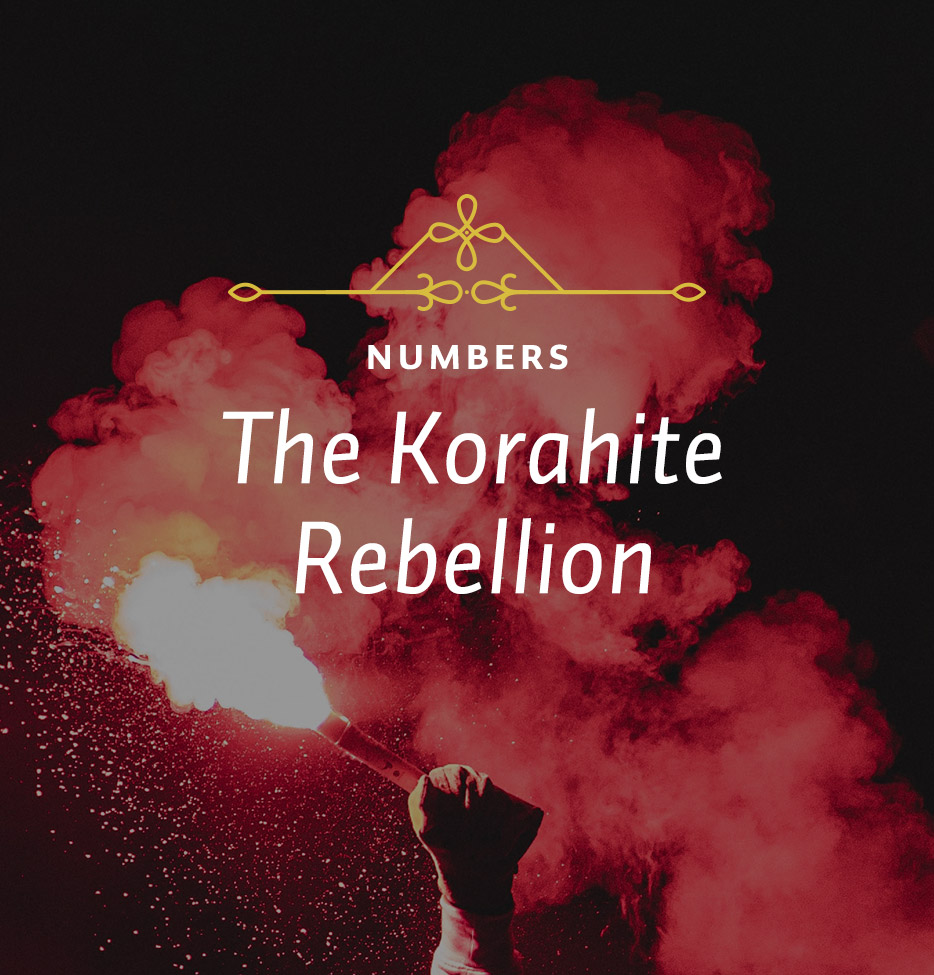Korah’s complaint wasn’t honestly expressed. He began by suggesting that he was really quite a democratic individual. All of the Jews were set apart as holy, and therefore what he really wanted to do was preserve their rights. Most rebellions begin with revolutionaries saying that they are on the side of the people and want everybody to be free. But of course, what they really want is to assume power for themselves. That is precisely that Korah wanted to do. He wanted to get rid of Aaron and be the priest, and that’s what Moses is responding to.
The Korahites were a particular branch of Levites, and they were on the south side of the tabernacle along with the Reubenites. As Korah associated closely with the Reubenites, apparently he began to insinuate his rebellious thoughts on them. He might have said something like this: “You know, I’m not interested in this for myself. But I just can’t stand aside when I recognize that you Reubenites, who are descended from Reuben, the first of the twelve tribes, are pushed aside in favor of some other tribe.” What he really wanted to do is start up a rebellion, which in the end would put him at the top of the pyramid.
When Korah expressed his dissatisfaction to Moses, Moses fell face down before the Lord. This position of submission to the Lord also indicates that when Moses speaks, as he later does, and tells Korah and his followers what they are to do, Moses isn’t just speaking on his own. Moses is speaking as the prophet of the Lord with the word of God, and God answers in a powerful way.
When Moses finally rose up, he told the Korahites and the 250 followers to take fire in their censers and stand before the Lord. Now, the point of this ought to be very clear by now. When two sons of Aaron presented unauthorized or unholy fire before the Lord, God judged them. They were in the priestly family and would have succeeded Aaron. But they didn’t follow the rules that God had laid down for the temple worship, and they were judged. Now, Moses is telling these people who want to take over the priesthood to go ahead and try it. See what’s going to happen. He pointed out that God is going to judge them. They should’ve been afraid. They should’ve remembered what happened to Aaron’s sons. But sin has a short memory. They conveniently left all of that in the past and thought they could get away with it now.
Moses’ response has two points that are worth noticing. He first tells the Levites in verse 7 that they have gone too far. That’s interesting because that’s what they said to him. They had said to Moses that all the people of God are holy, and that Moses was taking too much upon himself and had gone too far. But when they tried to take over Aaron’s priesthood, they were the ones who went too far because God had appointed Aaron as a priest, not them.
The second thing worth noting about Moses’ response is that when they are challenging both himself and Aaron for the leadership, it is not really Moses and Aaron they are challenging, but God. God had appointed Moses and Aaron. That’s the problem with attacking those in leadership. If they were really set there by God, then opposing them is opposing what God is doing.
The complaint that came next from Dathan and Abiram is somewhat different from that of Korah, and it’s also ruder and more self-important. Moses summons them to appear before him and they refuse to come. They explain their arrogance in this way: “You have not delivered on your promise to give us land flowing with milk and honey” (see v. 14). They even apply their point in a very strange way: “Isn’t it enough that you have brought us up out of a land flowing with milk and honey to kill us in the desert?” (16:13).
What a strange twisting of the facts. You could hardly have called Egypt a land of milk and honey, and certainly the slaves weren’t enjoying much of what was there. Moses had indeed brought them to the land of milk and honey. They stood on the very verge of the land, but refused to go in when they got a bad report from the ten spies. Besides all that, it wasn’t Moses who was leading them anyway. It was God. God had brought them to the land and the fact that they weren’t there was really a judgment of God for their unbelief and rebellion.
It must have been very painful for Moses to listen to that kind of rebellion. Although the people had been slaves in Egypt, Moses had been a very favored individual when he was growing up. If there was ever milk and honey to be had, Moses had it. But he had turned his back on all that, according to the book of Hebrews, in order to identify with the people in their slavery and help them in their struggles and in their wandering. Now they are saying that he had failed to deliver on his promise.






